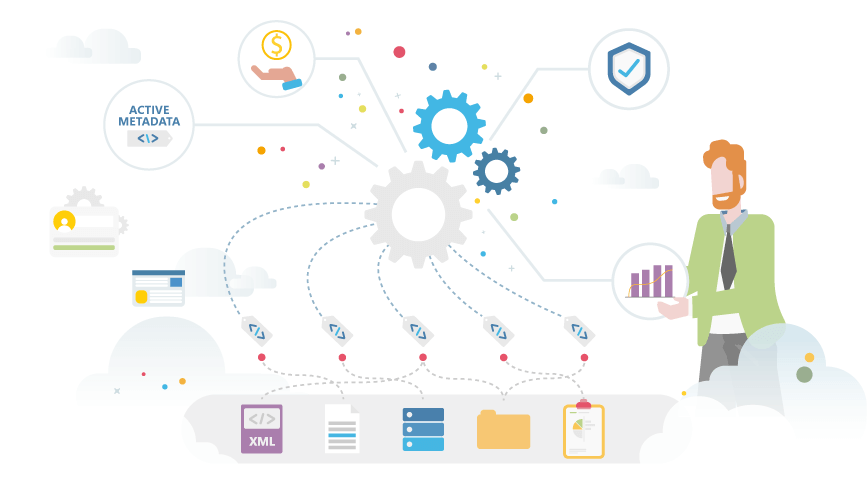According to Gartner (Hype Cycle for Data Management, 2020, 15 July 2020, Guido De Simoni), Metadata Management Solutions are applications with one or more of the following features:
- Metadata repository
- Business Glossary
- Data Lineage and impact analysis mapping and navigation tools
- Rule management engine
- Semantic framework
- Systems for ingestion and transformation of metadata from different sources
Big Data systems are becoming more and more widespread, the data available to companies – structured and unstructured, coming from numerous and diverse sources – is increasing, and specific regulations on data processing are growing (GDPR, BCBS 239, Solvency II, etc.). All this has led companies to look at Metadata Management. Metadata has thus become a critical element for managing business complexities. It helps to break down and reduce the problems that arise in business use cases, while their number continues to grow. While data is subject to frequent change, metadata is more stable. It can be used to automate some repetitive tasks. For example, certain steps can be performed automatically, or the user can receive suggestions for new control rules or for data worth protecting.
Metadata Management Solutions aim to make the complex case studies of Data Management, Data Governance, security and risk management, data valuation and analysis easily manageable. This is made possible by the active use of metadata and a collaborative approach between data providers and consumers.
What is metadata? What are the must-have features of a Metadata Management system?
Metadata contains the information about the organization’s data in the form of entities, associated attributes, and mutual relationships. According to the most classical taxonomy, we can classify these metadata into three distinct but interrelated types:
- business metadata (e.g. business terms, ownership semantics, associated processes, rules)
- technical metadata (e.g., physical fields, lengths and formats, computer applications, automatic controls)
- operational metadata (e.g. streams input, completion of transformation processes, results of controls in a given time period)
They are critical to obtaining the most complete knowledge of all the organization’s data and leveraging its value.
It is important that a metadata management system:
- is open to connections along two dimensions and in two directions:
“horizontal” – with other repositories. They register the data in the context of the entities that interact with the data (e.g., processes, applications, organizational charts), which are often managed in dedicated applications;
“vertical” – with the physical world. More specifically, they deal with Data Management tools: Data Integration, Data Quality, Data Profiling, Data Discovery, Data Masking. - In both cases, a Metadata Management system should allow communication to work both ways. For example, it can collect metadata about a process (name, description, owner, etc.) to integrate it with information about the input, output, or internal data of the process. Or it can provide search rules for business terms to a Data Discovery engine. If successful, the engine returns the names of the physical fields that correspond to that business term in the computer system. And so on.
- Adapts to the evolution of the business data model. Business processes are frequently revised, and new (and more data-intensive) regulatory requirements are introduced. There is also a need to support internal initiatives such as those aimed at the company’s Digital Transformation. All this means that not only the content, but also the structure of a metadata management system may be subject to changes, such as adding new entities, attributes, relationships.
- Uses passive metadata and transforms it into active metadata. Then they can control the functioning of the engines by automating repetitive tasks, automatically recognizing data domains, suggesting the most appropriate actions, and linking business terms to physical records. They can also classify data, identify similar data, and discover other relationships between them.
- Also has a collaborative environment. It is important that different users can define new entities, attributes and links according to the goals, views and perspectives of different business communities.
Irion EDM: the platform for Metadata Management Solutions and more.
Irion EDM is a fully metadata-driven Enterprise Data Management system.
Irion EDM makes it possible to:
- define a free and fully configurable metadata model without having to worry about immediately setting the final structure right away. You can add, remove or vary entities, relations, attributes, domains and access perimeters over time. Existing data is not lost, and the history of changes is saved;
- access a wide range of sources thanks to Irion connectors;
- manage all technical and business data related to the company’s data assets in one Data Catalog. And manage the associated connections without the performance problems that can be caused by the amount of metadata;
- organize the work (even concurrent) of multiple teams on the model structure and content with an exclusive enterprise-class change management system. There is no pre-built model. You have all the flexibility you need to fully and professionally manage your organization’s data assets.
With Irion EDM, metadata becomes a practical asset to your business:
- automate Data Governance reporting (Business Glossary, Enterprise Data Catalog) and more (control system documentation, processing logs, etc.);
- prepare and deliver information services based on available metadata to answer recurring questions (from management, business or IT analysts, Data Scientists, DPO) about the company’s data assets or to meet regulatory requirements;
- respond quickly to unexpected requests from both peers and internal and external controls (impact analysis, Data Quality, etc.);
- drive enterprise information management system functions (preparation, quality, transformation, masking, discovery, etc.) thanks to active metadata functionality.
These activities aim to establish a metadata-driven system and manage data in the best possible way. They are also dedicated to spreading the data culture and building trust in data thanks to efficient data assets governance.
Irion EDM helps implement a Data Strategy in accordance with the company’s culture, organizational structure and operating model.
Want to learn more?
We will provide you with illustrative examples of how other companies have already started their transformation.






